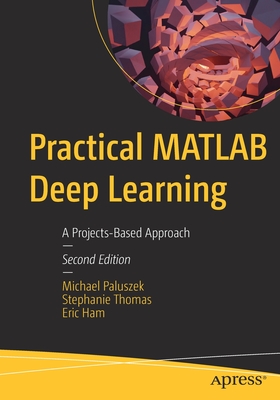MATLAB Machine Learning Recipes: A Problem-Solution Approach 3rd
暫譯: MATLAB 機器學習食譜:問題解決方法(第三版)
Paluszek, Michael, Thomas, Stephanie
- 出版商: Apress
- 出版日期: 2024-03-02
- 定價: $2,010
- 售價: 9.5 折 $1,910
- 貴賓價: 9.0 折 $1,809
- 語言: 英文
- 頁數: 545
- 裝訂: Quality Paper - also called trade paper
- ISBN: 1484298454
- ISBN-13: 9781484298459
-
相關分類:
Machine Learning、Matlab
立即出貨 (庫存=1)
相關主題
商品描述
Harness the power of MATLAB to resolve a wide range of machine learning challenges. This new and updated third edition provides examples of technologies critical to machine learning. Each example solves a real-world problem, and all code provided is executable. You can easily look up a particular problem and follow the steps in the solution.
This book has something for everyone interested in machine learning. It also has material that will allow those with an interest in other technology areas to see how machine learning and MATLAB can help them solve problems in their areas of expertise. The chapter on data representation and MATLAB graphics includes new data types and additional graphics. Chapters on fuzzy logic, simple neural nets, and autonomous driving have new examples added. And there is a new chapter on spacecraft attitude determination using neural nets. Authors Michael Paluszek and Stephanie Thomas show how all of these technologies allow you to build sophisticated applications to solve problems with pattern recognition, autonomous driving, expert systems, and much more.
What You Will Learn
- Write code for machine learning, adaptive control, and estimation using MATLAB
- Use MATLAB graphics and visualization tools for machine learning
- Become familiar with neural nets
- Build expert systems
- Understand adaptive control
- Gain knowledge of Kalman Filters
Who This Book Is For
Software engineers, control engineers, university faculty, undergraduate and graduate students, hobbyists.
商品描述(中文翻譯)
利用 MATLAB 的強大功能來解決各種機器學習挑戰。本書的第三版經過更新,提供了與機器學習密切相關的技術範例。每個範例都解決了一個現實世界的問題,並且所有提供的程式碼都是可執行的。您可以輕鬆查找特定問題並按照解決方案中的步驟進行操作。
這本書對所有對機器學習感興趣的人都有所幫助。它還包含了讓對其他技術領域感興趣的人了解機器學習和 MATLAB 如何幫助他們解決專業領域問題的材料。關於數據表示和 MATLAB 圖形的章節包括了新的數據類型和額外的圖形。模糊邏輯、簡單神經網絡和自動駕駛的章節新增了範例。此外,還有一章關於使用神經網絡進行航天器姿態確定的內容。作者 Michael Paluszek 和 Stephanie Thomas 展示了這些技術如何使您能夠構建複雜的應用程序,以解決模式識別、自動駕駛、專家系統等問題。
您將學到什麼
- 使用 MATLAB 編寫機器學習、自適應控制和估計的程式碼
- 使用 MATLAB 圖形和可視化工具進行機器學習
- 熟悉神經網絡
- 構建專家系統
- 理解自適應控制
- 獲得卡爾曼濾波器的知識
本書適合誰
軟體工程師、控制工程師、大學教職員、學士及碩士學生、愛好者。
作者簡介
Michael Paluszek is President of Princeton Satellite Systems, Inc. (PSS) in Plainsboro, New Jersey. Mr. Paluszek founded PSS in 1992 to provide aerospace consulting services. He used MATLAB to develop the control system and simulations for the Indostar-1 geosynchronous communications satellite. This led to the launch of Princeton Satellite Systems' first commercial MATLAB toolbox, the Spacecraft Control Toolbox, in 1995. Since then he has developed toolboxes and software packages for aircraft, submarines, robotics, and nuclear fusion propulsion, resulting in Princeton Satellite Systems' current extensive product line. He is working with the Princeton Plasma Physics Laboratory on a compact nuclear fusion reactor for energy generation and space. Mr. Paluszek is a lecturer at the Massachusetts Institute of Technology.
propulsion. He is also leading the development of new power electronics for fusion power systems and working on heat-engine-based auxiliary power systems for spacecraft.
Prior to founding PSS, Mr. Paluszek was an engineer at GE Astro Space in East Windsor, NJ. At GE he designed the Global Geospace Science Polar despun platform control system and led the design of the GPS IIR attitude control system, the Inmarsat-3 attitude control systems, and the Mars Observer delta-V control system, leveraging MATLAB for control design. Mr. Paluszek also worked on the attitude determination system for the DMSP meteorological satellites. Mr. Paluszek flew communication satellites on over twelve satellite launches, including the GSTAR III recovery, the first transfer of a satellite to an operational orbit using electric thrusters.
At Draper Laboratory Mr. Paluszek worked on the Space Shuttle, Space Station, and submarine naviga- tion. His Space Station work included designing Control Moment Gyro-based control systems for attitude control.
Mr. Paluszek received his bachelor's degree in Electrical Engineering, and master's and engineer's degrees in Aeronautics and Astronautics from the Massachusetts Institute of Technology. He is the author of numerous papers and has over a dozen U.S. Patents. Mr. Paluszek is the author of "MATLAB Recipes", "MATLAB Machine Learning," "Practical MATLAB Deep Learning, A Projects-Based Approach, Second Edition," all published by Apress, and "ADCS: Spacecraft Attitude Determination and Control Systems by Elsevier."
Stephanie Thomas is Vice President of Princeton Satellite Systems, Inc. in Plainsboro, New Jersey. She received her bachelor's and master's degrees in Aeronautics and Astronautics from the Massachusetts Institute of Technology in 1999 and 2001. Ms. Thomas was introduced to the PSS Spacecraft Control Toolbox for MATLAB during a summer internship in 1996 and has been using MATLAB for aerospace analysis ever since. In her nearly 20 years of MATLAB experience, she has developed many software tools including the Solar Sail Module for the Spacecraft Control Toolbox; a proximity satellite operations toolbox for the Air Force; collision monitoring Simulink blocks for the Prisma satellite mission; and launch vehicle analysis tools in MATLAB and Java, She has developed novel methods for space situation assessment such as
a numeric approach to assessing the general rendezvous problem between any two satellites implemented in both MATLAB and C++. Ms. Thomas has contributed to PSS' Attitude and Orbit Control textbook, featuring examples using the Spacecraft Control Toolbox, and written many software User's Guides. She has conducted SCT training for engineers from diverse locales such as Australia, Canada, Brazil, and Thailand and has performed MATLAB consulting for NASA, the Air Force, and the European Space Agency. Ms. Thomas is the author of "MATLAB Recipes" and "MATLAB Machine Learning" and "Practical MATLAB Deep Learning Projects" and 'Practical MATLAB Deep Learning Projects Version 2" published by Apress. In 2016, Ms. Thomas was named a NASA NIAC Fellow for the project "Fusion-Enabled Pluto Orbiter and Lander". Stephanie is an Associate Fellow of the AIAA and a member of the AIAA Propulsion and Energy Group.
作者簡介(中文翻譯)
邁克爾·帕盧塞克是位於新澤西州普林斯頓的普林斯頓衛星系統公司(PSS)的總裁。帕盧塞克先生於1992年創立PSS,提供航空航天諮詢服務。他使用MATLAB開發了Indostar-1靜止通信衛星的控制系統和模擬。這導致了普林斯頓衛星系統於1995年推出的第一個商業MATLAB工具箱——航天器控制工具箱。自那時以來,他為飛機、潛艇、機器人和核融合推進系統開發了工具箱和軟體包,形成了普林斯頓衛星系統目前廣泛的產品線。他正在與普林斯頓等離子體物理實驗室合作,開發用於能源生成和太空的緊湊型核融合反應堆。帕盧塞克先生是麻省理工學院的講師。
推進。他還領導新型電力電子設備的開發,用於融合電力系統,並致力於為航天器開發基於熱機的輔助電力系統。
在創立PSS之前,帕盧塞克先生曾在新澤西州東溫莎的GE Astro Space擔任工程師。在GE,他設計了全球地球科學極地去旋轉平台控制系統,並主導了GPS IIR姿態控制系統、Inmarsat-3姿態控制系統和火星觀測者的delta-V控制系統的設計,利用MATLAB進行控制設計。帕盧塞克先生還參與了DMSP氣象衛星的姿態確定系統的工作。他參與了超過十二次衛星發射的通信衛星,包括GSTAR III的回收,這是首次使用電推進器將衛星轉移到運行軌道。
在德雷珀實驗室,帕盧塞克先生參與了航天飛機、太空站和潛艇導航的工作。他在太空站的工作包括設計基於控制力矩陀螺的姿態控制系統。
帕盧塞克先生獲得了麻省理工學院的電機工程學士學位,以及航空學和航天學的碩士和工程學位。他是多篇論文的作者,擁有十多項美國專利。帕盧塞克先生是《MATLAB食譜》、《MATLAB機器學習》、《實用MATLAB深度學習:基於項目的方法(第二版)》的作者,這些書籍均由Apress出版,還有《ADCS:航天器姿態確定與控制系統》,由Elsevier出版。
史蒂芬妮·托馬斯是位於新澤西州普林斯頓的普林斯頓衛星系統公司的副總裁。她於1999年和2001年在麻省理工學院獲得航空學和航天學的學士和碩士學位。托馬斯女士在1996年的暑期實習中首次接觸到PSS的MATLAB航天器控制工具箱,並自此開始使用MATLAB進行航空航天分析。在近20年的MATLAB經驗中,她開發了許多軟體工具,包括航天器控制工具箱的太陽帆模組;為空軍開發的近距衛星操作工具箱;為Prisma衛星任務開發的碰撞監測Simulink模塊;以及在MATLAB和Java中開發的發射載具分析工具。她還開發了用於太空情況評估的新方法,例如
一種數值方法,用於評估任意兩顆衛星之間的一般會合問題,並在MATLAB和C++中實現。托馬斯女士為PSS的姿態和軌道控制教科書做出了貢獻,該書包含使用航天器控制工具箱的示例,並撰寫了許多軟體用戶指南。她為來自澳大利亞、加拿大、巴西和泰國等地的工程師進行了SCT培訓,並為NASA、空軍和歐洲航天局提供了MATLAB諮詢服務。托馬斯女士是《MATLAB食譜》、《MATLAB機器學習》和《實用MATLAB深度學習項目》及《實用MATLAB深度學習項目版本2》的作者,這些書籍均由Apress出版。2016年,托馬斯女士因項目《融合驅動的冥王星軌道器和著陸器》被評為NASA NIAC研究員。史蒂芬妮是AIAA的副研究員,也是AIAA推進與能源小組的成員。











